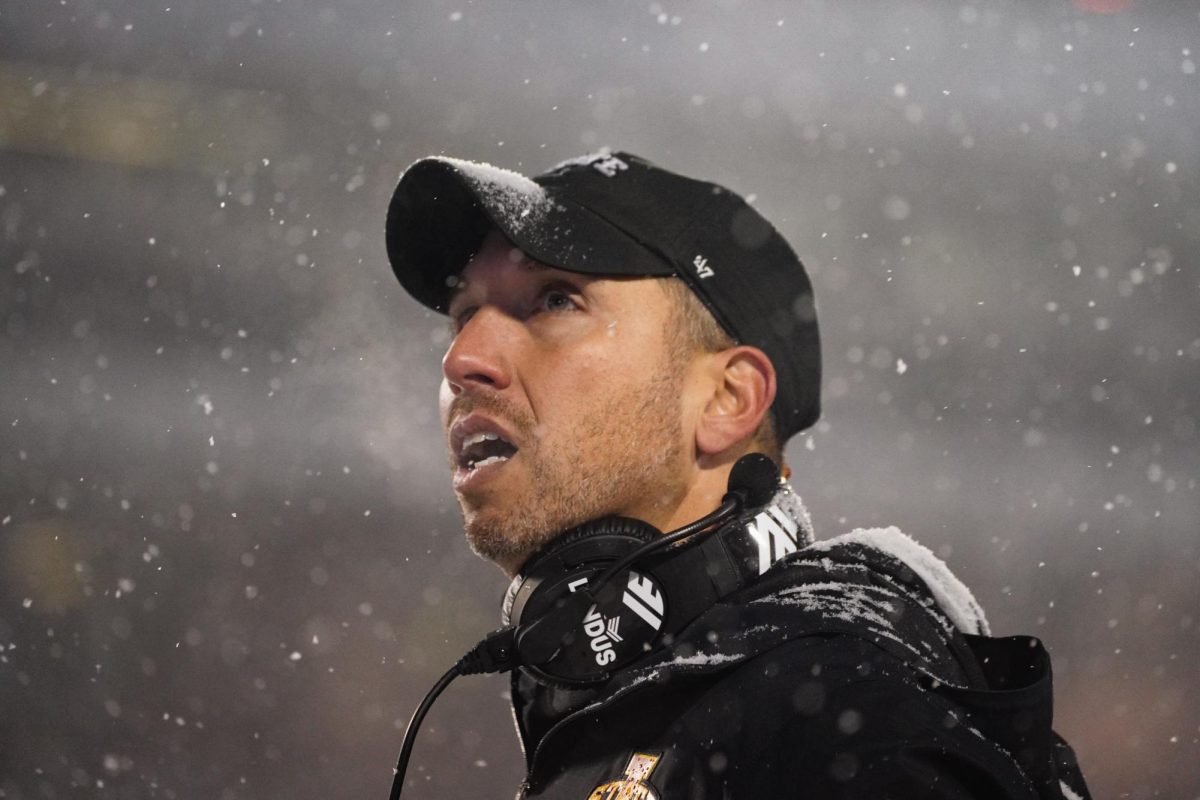’90s alternative still pulling Puppets’ strings
January 17, 2001

“Golden Lies”
Meat Puppets
Compare to: Dinosaur Jr., Fountains of Wayne, The Replacements
**
The Meat Puppets’ name first shone in the mainstream spotlight in 1994 when members from the band joined Nirvana onstage to perform three of their songs on Nirvana’s MTV Unplugged session.That recognition spawned the group’s biggest release the next year, “Too High to Die,” which included the hit “Backwater” and hidden track “Lake of Fire,” one of the songs done with Nirvana.Six years and three albums later, the Meat Puppets are not as well known in the mainstream, but have kept their underground success a vital part of its 19-year career.”Golden Lies” finds the band more toned down than on their punk/rock infested late ’80s and early ’90s releases. But the album sticks with the staple Meat Puppet sound that includes melodic pop vocals and sometimes creepy, always catchy, guitar riffs.Some rare new and creative sounds pop on this record in a verse from “Take Off Your Clothes” that is almost rapped between frontmen Curt Kirkwood and Kyle Ellison. “Oh my God I must be dreaming/ if this is dream, then why am I screaming/ take off your clothes there’s nothing showing/ out of the sun, the cold wind’s blowing.”The reason for the Meat Puppets’ underground success as opposed to a large amount of mainstream success is the fact that this kind of music definitely requires a certain taste. The bottom line is that listening to the Meat Puppets is like taking a history lecture at Iowa State — it is somewhat exciting about once a semester, but the rest of the time you just want to skip and play Playstation.This is the kind of band that only needs to release one album unless they keep their sound evolving. But “Golden Lies” is just like listening to something the band did in the early ’90s. And stock alternative music from the early ’90s just isn’t that much fun to listen to anymore.— Kyle Moss

“Jimmy Eat World/
Jebediah”
Jimmy Eat World and Jebediah
Compare to: Sense Field, Mineral, God’s Reflex
***
The first time they hear the “post-major label” version of Arizona-based emotional outfit Jimmy Eat World, listeners will feel relaxed. Although I suppose that’s what one always feels after listening to JEW. However, that familiar sound that appears once again on this split with Aussie pop-stars Jebediah will reassure you that the band’s new full-length (due out this Spring) will be just as dynamic as 1998’s “Clarity.” Of the three tracks by Jimmy Eat World, “The Most Beautiful Things” may very well be the best example of what this band has to offer to new listeners. The song highlights frontman Jim Adkins’ celestial voice, which has come a long way from the nearly raspy days of their major label debut, “Static Prevails,” and it is completely fitting for this type of music. JEW falls somewhere between an energetic punk band and a soundtrack for a sad movie. However, they have been one of the few bands to successfully mix this combination. “No Sensitivity” brings about the band’s more energetic side. It uses that same “pop song in disguise” format that makes up the structure of every JEW song. But after repeated listens, one will find that Jimmy Eat World goes far beyond that concept.Jebediah is very similar to JEW, though much more successful in their home country; they’ve already gone double platinum in Australia. However, it may be tough to get used to the lead vocals as they seem almost too flat for the music.Jebediah achieves the basic pop sound that most alternative bands have here in the states. However, the obvious cultural differences make for an interesting sound.The split does a great job in introducing a new band in Jebediah and reintroducing fans to Jimmy Eat World, one of the premier emotional pop acts. — Dewayne Hankins

“Scattered, Smothered and Covered”
Hootie and
the Blowfish
Compare to: Toad the Wet Sprocket, Dave Matthews
**
Since breaking out with “Cracked Rear View” in 1995, the South Carolina-based Hootie and the Blowfish have experienced a dwindling fan base. They hope to improve on that with their new album, “Scattered, Smothered and Covered,” which features covers recorded and performed during their studio sessions for their last three albums.The first three tracks were recorded during the “Rear View” sessions and include the radio hit “I Go Blind,” which also appears on the “Friends” soundtrack. The light sound that made fans listen a few years ago is displayed in these three songs, especially in a remake of Radney Foster’s “Fine Line.”The next bunch of songs feature covers from the “Fairweather Johnson” recording era, where the band kept the poppy sound, but added a little bit of edge. Like “Johnson,” the songs in this section replace Darius Rucker’s acoustic guitar for a more electric-driven yet fairly simplistic pace.Only one song on the album was covered during the “Musical Chairs” recordings. “Driver 8,” a song done by infamous rock legends R.E.M., starts a set of tracks that reflects how “Chairs” was put together, with Hootie showcasing a set of styles and instruments that is unfamiliar to fans. One example is “Use Me,” a cover from R&B legend Bill Withers, and its beat-driven power that differs from the band’s usual flowing guitar base.One remake that seemed out of place was “Dream Baby,” a classic hit by Roy Orbison, which they did for the “White Man’s Burden” soundtrack. While introducing the song to a whole new genre, Rucker’s voice cannot do the song the justice that Orbison’s haunting style could.Overall, this album serves diehard Hootie fans with a timeline of how the band has grown and expanded over the past few years. For everyone else, it’s just more fuel to add to the fire that is the dwindling fan base.— Jonathan Lowe






